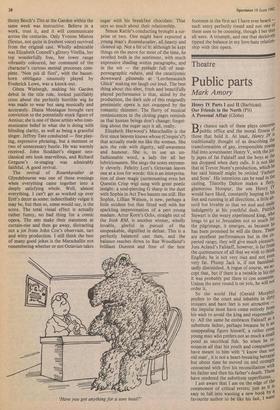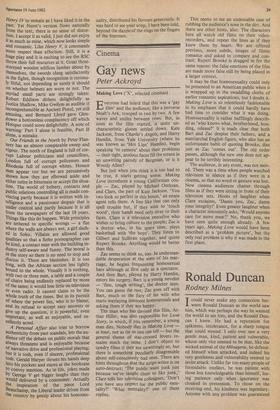Theatre
Public parts
Mark Amory
Henry IV Parts I and II (Barbican) Our Friends in the North (Pit) A Personal Affair (Globe) By chance each of these plays conceals public office and the moral fitness of those that hold it. At least, Henry IV is traditionally thought of as describing the transformation of gay, irresponsible young Hal into scoutmaster Henry V, with the PI' ly japes of fat Falstaff and the boys at the inn dropped when duty calls. It is not like that in Trevor Nunn's production, which he has said himself might be retitled 'Fathers and Sons'. His intentions can be read in the casting. Timothy Dalton makes a fiery, glamorous Hotspur, the son Henry I`! would have liked, constantly leaping to his feet and running in all directions, a little ab- surd but lovable so that we nod and smile indulgently at his youthful dash. Patrick Stewart is the weary experienced king, who longs to go to Jerusalem not so much for the pilgrimage, it emerges, as because he has been promised he will die there. These are excellent performances but in the ex- pected range; they will give much pleasure. Joss Acland's Falstaff, however, is far from the quintessence of all that we wish to think English; he is not very nice and not even very fat. Plump Jack is, if not banished, sadly diminished. A rogue of course, we ac- cept that, but if there is a twinkle in his eye it was probably put there to con someone' Unless the next round is on you, he will not order it. So the world Hal (Gerald MurPhY) prefers to the court and inhabits in dirty trousers and bare feet is not attractive the impulse must have come entirely fr°,11/. his wish to avoid the king and responsibil- ty. All the same he embraces Falstaff as a substitute father, perhaps because he is an unappealing figure himself, a rather cross young man who prefers not so much a small pond as uncritical fish. So when he re- nounces all that his youth and companions have meant to him with 'I know thee not, old man', it is not a heart-breaking betraYai but about time he moved on and strongly connected with first his reconciliation with his father and then his father's death. These have rendered the substitute superfluous. I am aware that I am on the edge of the commonest of critical errors; just as it is easy to fall into wanting a new book by a favourite author to be like his last, I want Henry IV to remain as I have liked it in the Past. Yet Nunn's version flows naturally from the text, there is no sense of distor- tion. I accept it as valid, I just did not enjoy it as much as mine, Which now looks simple and romantic. Like Henry V, it commands More respect than affection. Still, it is a huge play and it is exciting to see the RSC throw their full resources at it. Great three- storeyed wooden edifices lumber about by themselves, the swords clang satisfactorily in the fights, though recognition is curious- lY fitful, not depending as surely it should on whether helmets are worn or not. The myriad small parts are strongly taken: Robert Eddison dithers delightfully as Justice Shallow, Mike Gwilym as audible if incomprehensible as Ancient Pistol, yet still amusing, and Bernard Lloyd gave Glen- dower a bottomless complacency off which Hotspur could score delightfully. A note of warning: Part I alone is feasible, Part II alone, a mistake. Our Friends in the North by Peter Flan- nery has an almost comparable sweep and vigour. The north of England is full of cor-. rupt Labour politicians and councillors, London full of corrupt policemen and Rhodesia full of corrupt whites. Honest men appear too but we are persuasively shown how they are elbowed aside and either retire in bitterness or accept the situa- tion. The world of bribery, contacts and Public relations controlling all is made con- vincing partly because it is written with in- telligence and a passionate despair that is under control and partly because it is all from the newspapers of the last 18 years. Things like this do happen. Wide principles are tethered to specific wrongs — a flat where the walls are always wet, a girl slash- ed in Soho. Villains are allowed good qualities so that a Soho pornographer can be kind, a contact man with the building in- dustry self-aware and funny. The moral is in the story so there is no need to stop and discuss it. There are blemishes. It is too 1°118, with the African section less tightly bound to the whole. Visually it is nothing, with two or three men, a table and a couple of chairs being endlessly replaced by more of the same; it would lose little on television or even radio. It cannot claim to be the whole truth of the times. But in its pursuit of where the power lies, who is to blame, and its refusal to accept easy answers or give up the question, it is powerful, even important, as well as enjoyable, and ex- cellently acted.
A Personal Affair also tries to borrow authenticity from past scandals, lets the au- dience off the debate on public morals that always threatens and is enjoyable because of narrative drive and professional playing; but it is tosh, even if sincere, professional Cosh. Gerald Harper thrusts his hands deep into his pockets and stares at the bookcase to convey emotion. As in life, jokes made by George V get bigger laughs than they would delivered by a commoner. Actually the inspiration of the piece Lord Beauchamp, the Liberal leader driven from the Country by gossip about his homosex- uality, distributed his favours generously. It was hard to see your soup, I have been told, beyond the dazzle of the rings on the fingers of the footmen.





































 Previous page
Previous page